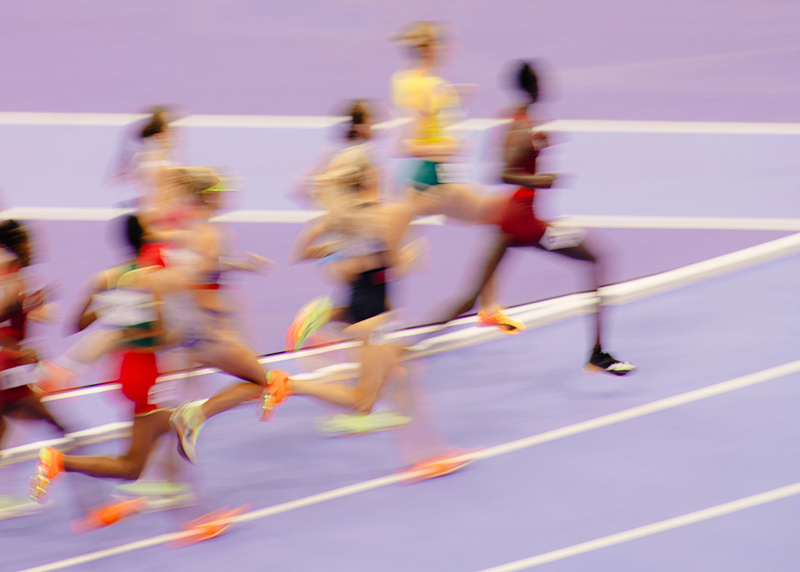British Triathlon Creates New “Open” Category for Trans Athletes
Federation claims new policy is an effort to be more inclusive, but transgender advocates call it “harmful."

The British Triathlon has released updated rules that create a new “open” category for transgender athletes as part of a push to ban trans women from competing against cisgender women.
The federation’s new policy requires that “all individuals including male, transgender and those non-binary who were male sex at birth” be placed into an “open” category, separate from people assigned female at birth.
With the creation of the “open” category, only those athletes who were assigned female at birth will be allowed to participate in international events designated for females.
The policy does not mention in which category a trans man assigned female at birth is expected to compete, although presumably they would be relegated to the “open” category if they are taking testosterone to transition — which might be considered an unfair advantage.
The new policy goes into on Jan. 1, 2023, and applies to all races held in the United Kingdom.
In a statement, the British Triathlon explained that this policy is an attempt at making the sport more inclusive — allowing transgender females and nonbinary athletes assigned male at birth to compete, while ensuring that they do not unfairly benefit from physical advantages they hold over cisgender female competitors.
“British Triathlon has reviewed its Transgender Policy following a period of consultation to ensure that it reflects the needs of our sport, protects fairness in competition, and serves our desire to make triathlon truly inclusive,” the federation said.
The British Triathlon’s governing body said it they consulted with over 3,000 participants, forming focus groups and conducting interviews before deciding to establish the policy. Only 16 of the over 3,000 identified as transgender.
“We started this process at the end of 2021 and went through a period of independent consultation earlier this year to explore options for categorization into triathlon competition in Great Britain,” the federation continued in its statement. “This ensured that along with the latest research, we heard from our community, key groups, and individuals about their views and experiences.”
This is the first time a sports governing body in the United Kingdom has created an “open” category that includes transgender and nonbinary people.
British Triathlon chief executive Andy Salmon explained that the sport is “gender-affected” and that “fairness is paramount” where there is “competitive activity”, according to the BBC.
“We believe this is the right policy for triathlon in Great Britain, and the right time to publish it,” Salmon said. “We have taken legal advice and are confident it’s legally robust.”
Salmon said the British Triathlon’s board didn’t know of any “elite” trans female athletes, but didn’t want to wait for “that to be a problem” before they “tried to fix it.”
This new policy replaces the 2018 one which had allowed all women, regardless of gender identity, to compete in the same category, so long as trans females’ levels of testosterone in the blood fell below a specific level.
Amy Gadd, a triathlete who serves as director of operations and direct service delivery at Mermaids, a UK-based transgender charity and advocacy organization, told PinkNews that British Triathlon’s new trans policy was devastating.
“As a trans woman who has participated in triathlons since 2016, I am extremely disappointed about being excluded from the female category,” Gadd said.
Gadd, who has participated in seven years of triathlons, recently shared how the races helped her mental health in an article for the British Triathlon during the UK’s LGBTQ History Month in February. Now, she feels the sport is hurting more than helping.
“This only serves to segregate women and girls which is not good for anyone. I now have to make the decision as to whether I want to take part in a sport that doesn’t recognize me as a female,” Gadd said.
The British Triathlon’s new policy follows a similar decision from FINA, the international governing body for water sports. FINA recently adopted a new policy that effectively bans most, if not all, transgender females from competing in women’s events based on whether they’ve undergone male puberty. FINA has set up a working group tasked with creating an “open” category that would allow transgender athletes to compete in the future, but has not yet done so.
The Pro-LGBTQ+ group Athlete Ally has denounced FINA’s policy as “deeply discriminatory, harmful” and “unscientific.”
Support Metro Weekly’s Journalism
These are challenging times for news organizations. And yet it’s crucial we stay active and provide vital resources and information to both our local readers and the world. So won’t you please take a moment and consider supporting Metro Weekly with a membership? For as little as $5 a month, you can help ensure Metro Weekly magazine and MetroWeekly.com remain free, viable resources as we provide the best, most diverse, culturally-resonant LGBTQ coverage in both the D.C. region and around the world. Memberships come with exclusive perks and discounts, your own personal digital delivery of each week’s magazine (and an archive), access to our Member's Lounge when it launches this fall, and exclusive members-only items like Metro Weekly Membership Mugs and Tote Bags! Check out all our membership levels here and please join us today!


























You must be logged in to post a comment.